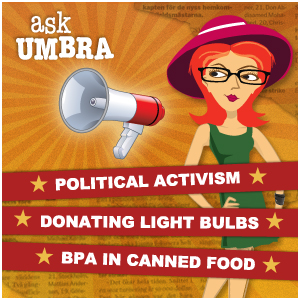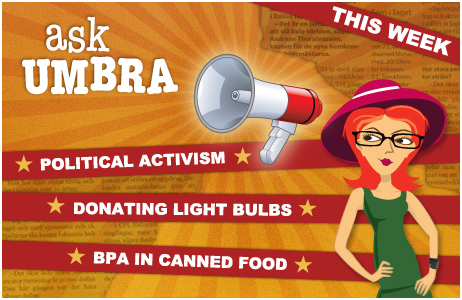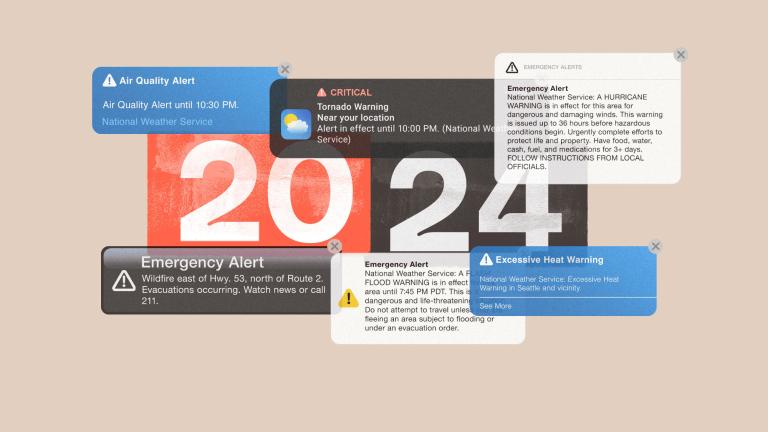Send your question to Umbra!
Q. Dear Umbra,
A while back, you said that political activism was really important. I think I can tear myself away from my new(ish) organic garden long enough to do a little, but I’m not sure what to do. How can I be politically active with my busy schedule?
Jon B.
Lakewood, Ohio
A. Dearest Jon,

Happy Presidents Day, a perfect occasion to reflect on how you can get more involved in the political landscape of our great country. Let’s face it — your garden is probably in deep freeze mode at the moment, so you may have a little time on your hands. And the good news is that political activism doesn’t have to be a major time suck. Perhaps just cut your Facebook, email, reading, or TV time in half, and devote some of the excess to taking action. Do you have the day off today? If so, even better!
First off, think about what’s really important to you. What are your values? Are you frustrated with climate and energy policies (or lack thereof)? Do you want schools to serve healthier lunches? Are you worried about billboards in national parks? Maybe you want to ensure the survival of orangutans or tree kangaroos. Whatever it is, educate yourself, read everything you can about the issues — from both sides — and figure out where you stand. Then let your voice be heard.
Engage in the lost art of letter writing. If you’re not sure whom to write or what the hot-button issues are, check out organizations like the Sierra Club, Greenpeace, the national League of Conservation Voters, or your state LCV, which can fill you in on action items, bills that are up for debate, and legislators that need to be contacted to hear your support or opposition. Sign a petition. Engage in an act of civil disobedience (check out The Yes Men for some inspiration). Get involved with organizations like 1Sky, which provides tools like a letter template to contact your local newspaper to spread the word about the importance of a strong clean energy bill. Or volunteer for a town board or committee — obviously more of a commitment, but a delightful way to have a political impact with results you can really see.
Finally, it sounds really simple, but vote. As I’ve said before, yes, our particular system of democracy is indeed flawed, but pouting on the sidelines doesn’t do anything except potentially make you miserable. So whether it’s on the local, state, or national level, read up on the candidates and issues and cast that ballot. And if you’re too busy to get to the polls, ask for an absentee ballot. Whatever you do, thanks for stepping up — and for the organic gardening, too (spring’s just around the corner).
Patriotically,
Umbra
Q. Dear Umbra,
We switched out all the light bulbs in our home and office to CFL. What do we do with the old incandescent ones? I am considering donating them to a local women’s shelter, but should I just put them in the recycling?
Katy
Charleston, S.C.
A. Dearest Katy,
You made the switch — that’s splendid! Give yourself a hearty pat on the back.
Now, I can’t tell you whether you can recycle your incandescent bulbs — you’ll have to check with your local recycling program for that info. However, donating them to a local women’s shelter, where they can have another life before they die, is a better option than tossing the still-viable bulbs into the trash can. Props to you for your sense of altruism. And if you’re feeling really generous, throw (well, gently nestle) a few new CFL bulbs into the mix with your donation.
Remember, when it comes time to replace your CFLs, don’t toss them in the trash. Because of the small amount of mercury these bulbs contain, they’ll need to be handed over to your local hazardous waste peeps. Check out LampRecycle.org for places to recycle compact fluorescents in your neck of the woods.
Brightly,
Umbra
I get acres of letters every week from readers, and unfortunately, I can’t answer them all. The ones I do answer can sometimes take a little while to make it into the rotation. Thus I occasionally hear from especially eager readers, like the one below, who have gone the extra mile to solve their own conundrum.
Q. Dear Umbra,
In my quest to find organic tomato sauce without sugar, I have been forced into making my own sauce. I was happy to find organic crushed tomatoes in a can. All I need to do is add onions, garlic, some spices, and cook for 20 minutes. I just read somewhere that some cans are lined with plastic and this can be toxic. Is this true? I wrote to the companies (Muir Glen and ShopRite) inquiring about this, and I never received an answer. Please don’t tell me I need to start crushing the tomatoes myself.
Veronica L.
East Stroudsburg, Pa.
Q. Dear Umbra,
I am looking into the practice of lining cans with plastic. I emailed some companies asking if they do this — no reply. Dude, I even emailed you for help. Well, the Environmental Working Group website came through again.
Everyone seems to use it except for Eden foods.
Veronica L.
East Stroudsburg, Pa.
A. Dearest Veronica,
Way to be industrious with your research! I heartily embrace the EWG site for just this sort of dilemma. My advice would be to take things a step further: Write back to the companies, telling them your concerns about the bisphenol-A often used in the lining of canned foods, the nasty effects of it, and your decision to switch to a brand that doesn’t use BPA-lined cans. Also, request a reply detailing the companies’ plans to find an alternative. Perhaps send a copy of the email to friends, asking that they also contact the companies with the same message.
Before long, you’ll have a grassroots movement on your hands, which is way better than having BPA on them.
Cannily,
Umbra


